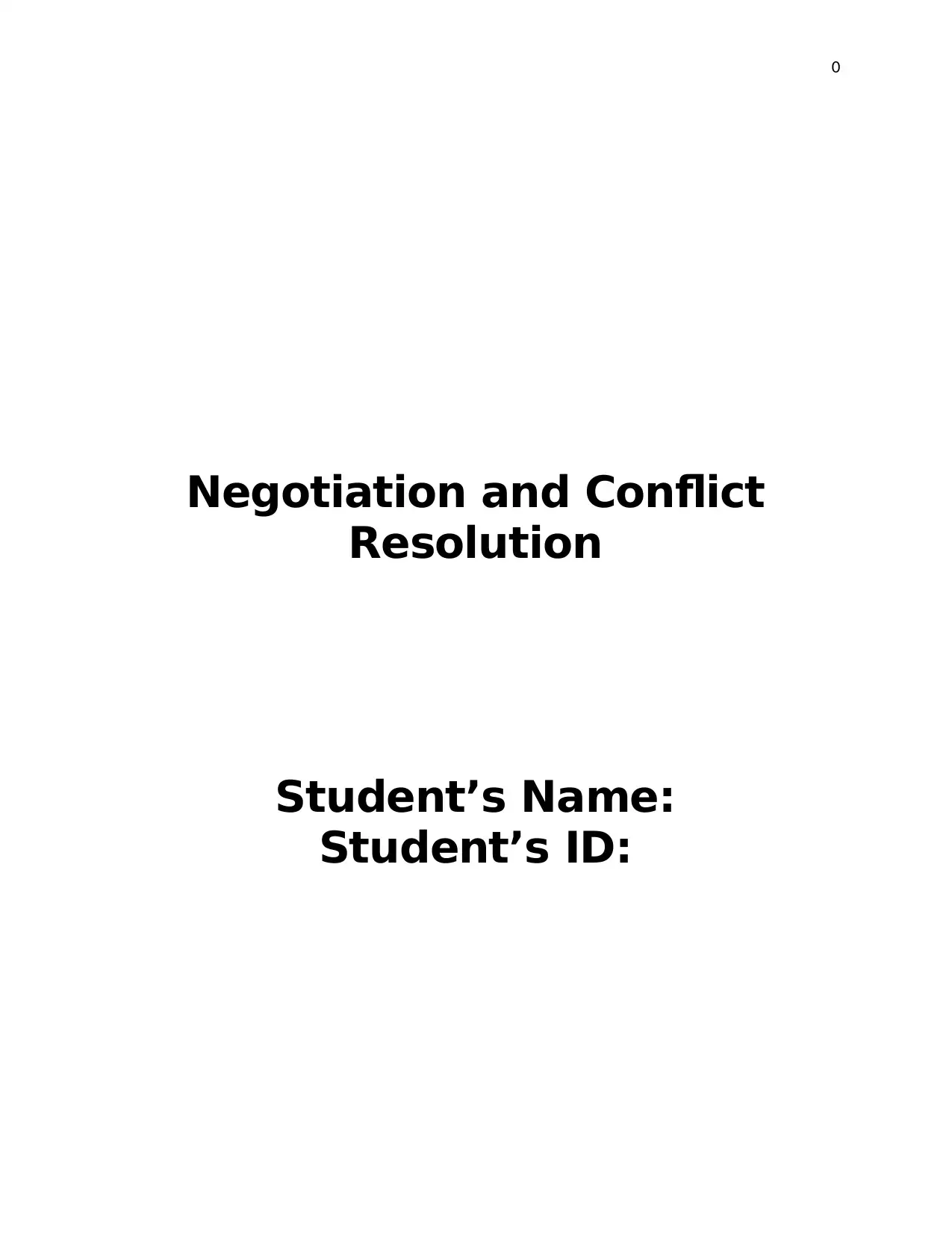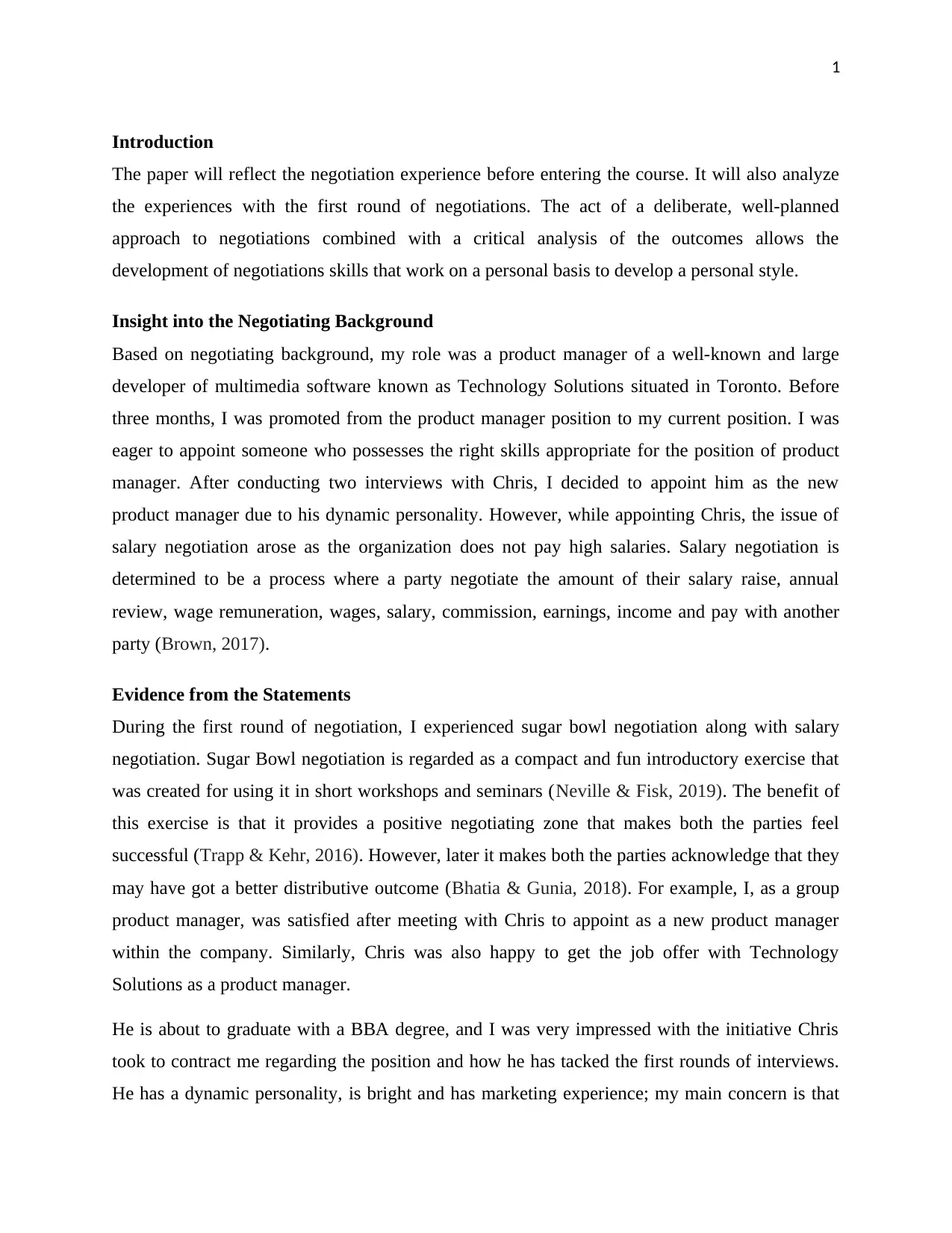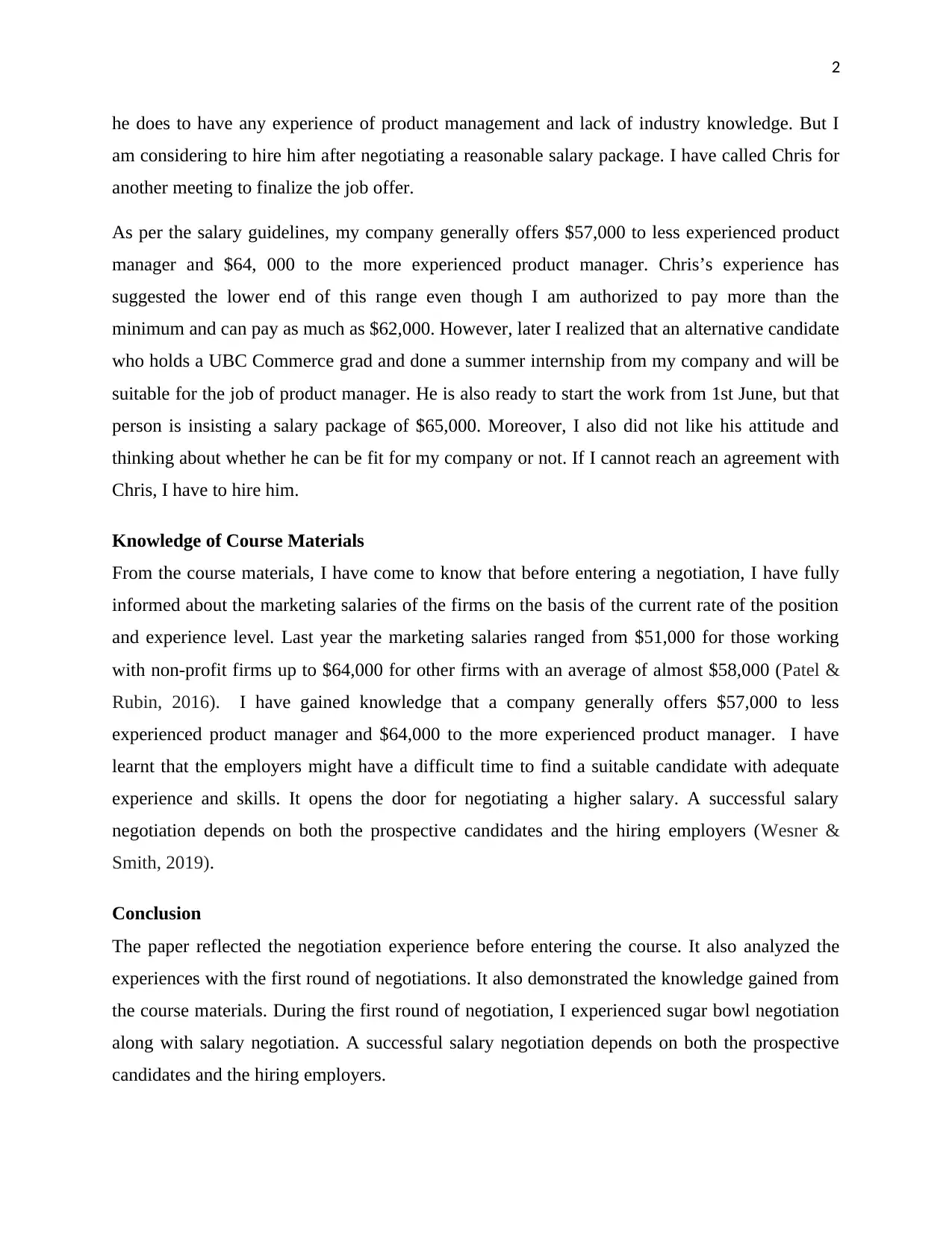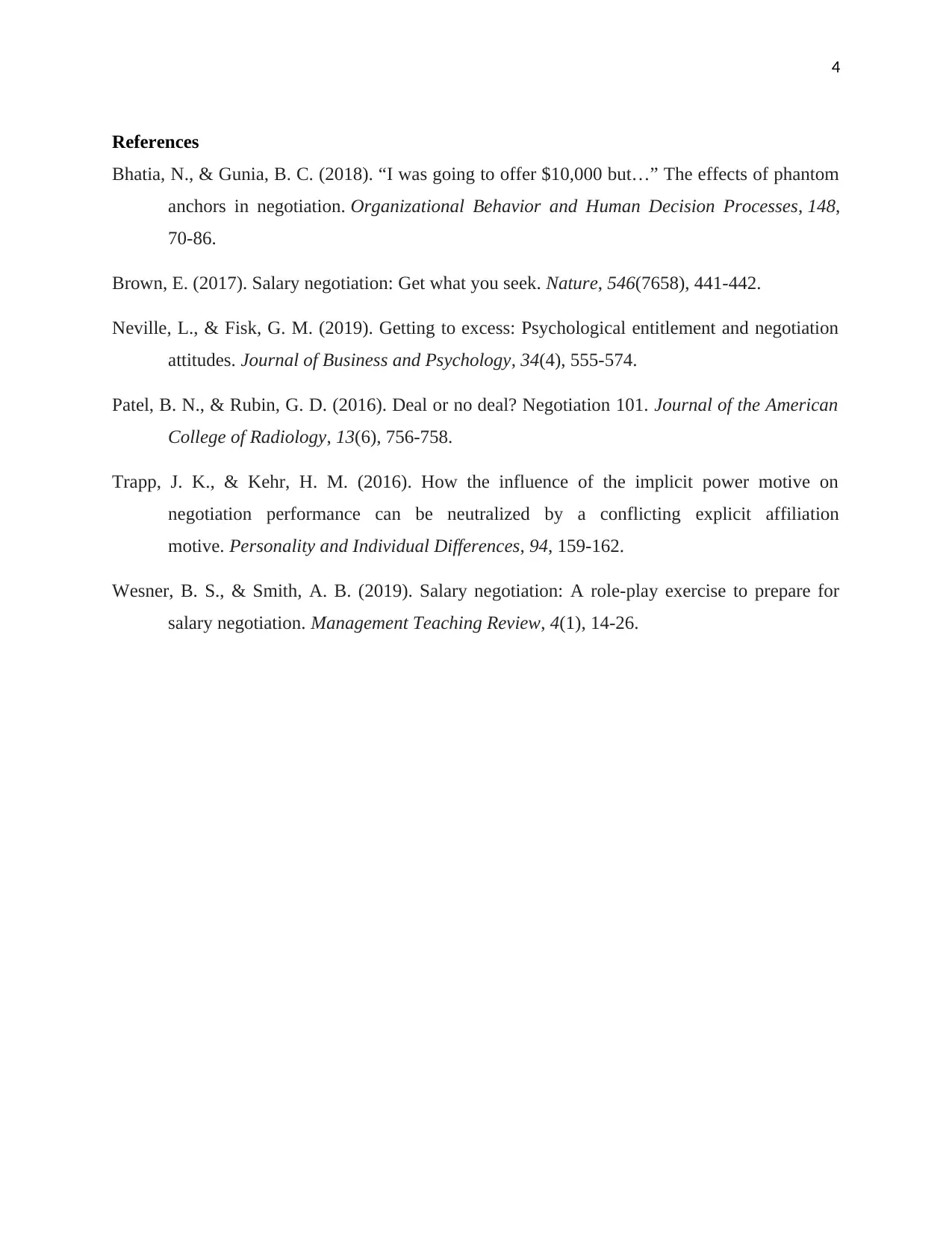Negotiation and Conflict Resolution: Personal Experience Report
VerifiedAdded on 2022/08/19
|5
|1095
|15
Report
AI Summary
This report presents a student's reflection on negotiation experiences, focusing on a scenario involving a product manager role at Technology Solutions. The analysis covers a salary negotiation process with a potential candidate, Chris, and compares it to the negotiation with another candidate. The report discusses the application of course materials to this real-world scenario, including the understanding of salary ranges and negotiation strategies. The student highlights the use of 'sugar bowl negotiation' and the importance of informed decision-making. The paper also reflects on the knowledge gained from the course, such as salary benchmarks and the factors influencing successful negotiation outcomes. The conclusion emphasizes the significance of negotiation skills and the practical application of course concepts in professional settings. The report also references relevant academic sources to support the analysis.

0
Negotiation and Conflict
Resolution
Student’s Name:
Student’s ID:
Negotiation and Conflict
Resolution
Student’s Name:
Student’s ID:
Paraphrase This Document
Need a fresh take? Get an instant paraphrase of this document with our AI Paraphraser

1
Introduction
The paper will reflect the negotiation experience before entering the course. It will also analyze
the experiences with the first round of negotiations. The act of a deliberate, well-planned
approach to negotiations combined with a critical analysis of the outcomes allows the
development of negotiations skills that work on a personal basis to develop a personal style.
Insight into the Negotiating Background
Based on negotiating background, my role was a product manager of a well-known and large
developer of multimedia software known as Technology Solutions situated in Toronto. Before
three months, I was promoted from the product manager position to my current position. I was
eager to appoint someone who possesses the right skills appropriate for the position of product
manager. After conducting two interviews with Chris, I decided to appoint him as the new
product manager due to his dynamic personality. However, while appointing Chris, the issue of
salary negotiation arose as the organization does not pay high salaries. Salary negotiation is
determined to be a process where a party negotiate the amount of their salary raise, annual
review, wage remuneration, wages, salary, commission, earnings, income and pay with another
party (Brown, 2017).
Evidence from the Statements
During the first round of negotiation, I experienced sugar bowl negotiation along with salary
negotiation. Sugar Bowl negotiation is regarded as a compact and fun introductory exercise that
was created for using it in short workshops and seminars (Neville & Fisk, 2019). The benefit of
this exercise is that it provides a positive negotiating zone that makes both the parties feel
successful (Trapp & Kehr, 2016). However, later it makes both the parties acknowledge that they
may have got a better distributive outcome (Bhatia & Gunia, 2018). For example, I, as a group
product manager, was satisfied after meeting with Chris to appoint as a new product manager
within the company. Similarly, Chris was also happy to get the job offer with Technology
Solutions as a product manager.
He is about to graduate with a BBA degree, and I was very impressed with the initiative Chris
took to contract me regarding the position and how he has tacked the first rounds of interviews.
He has a dynamic personality, is bright and has marketing experience; my main concern is that
Introduction
The paper will reflect the negotiation experience before entering the course. It will also analyze
the experiences with the first round of negotiations. The act of a deliberate, well-planned
approach to negotiations combined with a critical analysis of the outcomes allows the
development of negotiations skills that work on a personal basis to develop a personal style.
Insight into the Negotiating Background
Based on negotiating background, my role was a product manager of a well-known and large
developer of multimedia software known as Technology Solutions situated in Toronto. Before
three months, I was promoted from the product manager position to my current position. I was
eager to appoint someone who possesses the right skills appropriate for the position of product
manager. After conducting two interviews with Chris, I decided to appoint him as the new
product manager due to his dynamic personality. However, while appointing Chris, the issue of
salary negotiation arose as the organization does not pay high salaries. Salary negotiation is
determined to be a process where a party negotiate the amount of their salary raise, annual
review, wage remuneration, wages, salary, commission, earnings, income and pay with another
party (Brown, 2017).
Evidence from the Statements
During the first round of negotiation, I experienced sugar bowl negotiation along with salary
negotiation. Sugar Bowl negotiation is regarded as a compact and fun introductory exercise that
was created for using it in short workshops and seminars (Neville & Fisk, 2019). The benefit of
this exercise is that it provides a positive negotiating zone that makes both the parties feel
successful (Trapp & Kehr, 2016). However, later it makes both the parties acknowledge that they
may have got a better distributive outcome (Bhatia & Gunia, 2018). For example, I, as a group
product manager, was satisfied after meeting with Chris to appoint as a new product manager
within the company. Similarly, Chris was also happy to get the job offer with Technology
Solutions as a product manager.
He is about to graduate with a BBA degree, and I was very impressed with the initiative Chris
took to contract me regarding the position and how he has tacked the first rounds of interviews.
He has a dynamic personality, is bright and has marketing experience; my main concern is that

2
he does to have any experience of product management and lack of industry knowledge. But I
am considering to hire him after negotiating a reasonable salary package. I have called Chris for
another meeting to finalize the job offer.
As per the salary guidelines, my company generally offers $57,000 to less experienced product
manager and $64, 000 to the more experienced product manager. Chris’s experience has
suggested the lower end of this range even though I am authorized to pay more than the
minimum and can pay as much as $62,000. However, later I realized that an alternative candidate
who holds a UBC Commerce grad and done a summer internship from my company and will be
suitable for the job of product manager. He is also ready to start the work from 1st June, but that
person is insisting a salary package of $65,000. Moreover, I also did not like his attitude and
thinking about whether he can be fit for my company or not. If I cannot reach an agreement with
Chris, I have to hire him.
Knowledge of Course Materials
From the course materials, I have come to know that before entering a negotiation, I have fully
informed about the marketing salaries of the firms on the basis of the current rate of the position
and experience level. Last year the marketing salaries ranged from $51,000 for those working
with non-profit firms up to $64,000 for other firms with an average of almost $58,000 (Patel &
Rubin, 2016). I have gained knowledge that a company generally offers $57,000 to less
experienced product manager and $64,000 to the more experienced product manager. I have
learnt that the employers might have a difficult time to find a suitable candidate with adequate
experience and skills. It opens the door for negotiating a higher salary. A successful salary
negotiation depends on both the prospective candidates and the hiring employers (Wesner &
Smith, 2019).
Conclusion
The paper reflected the negotiation experience before entering the course. It also analyzed the
experiences with the first round of negotiations. It also demonstrated the knowledge gained from
the course materials. During the first round of negotiation, I experienced sugar bowl negotiation
along with salary negotiation. A successful salary negotiation depends on both the prospective
candidates and the hiring employers.
he does to have any experience of product management and lack of industry knowledge. But I
am considering to hire him after negotiating a reasonable salary package. I have called Chris for
another meeting to finalize the job offer.
As per the salary guidelines, my company generally offers $57,000 to less experienced product
manager and $64, 000 to the more experienced product manager. Chris’s experience has
suggested the lower end of this range even though I am authorized to pay more than the
minimum and can pay as much as $62,000. However, later I realized that an alternative candidate
who holds a UBC Commerce grad and done a summer internship from my company and will be
suitable for the job of product manager. He is also ready to start the work from 1st June, but that
person is insisting a salary package of $65,000. Moreover, I also did not like his attitude and
thinking about whether he can be fit for my company or not. If I cannot reach an agreement with
Chris, I have to hire him.
Knowledge of Course Materials
From the course materials, I have come to know that before entering a negotiation, I have fully
informed about the marketing salaries of the firms on the basis of the current rate of the position
and experience level. Last year the marketing salaries ranged from $51,000 for those working
with non-profit firms up to $64,000 for other firms with an average of almost $58,000 (Patel &
Rubin, 2016). I have gained knowledge that a company generally offers $57,000 to less
experienced product manager and $64,000 to the more experienced product manager. I have
learnt that the employers might have a difficult time to find a suitable candidate with adequate
experience and skills. It opens the door for negotiating a higher salary. A successful salary
negotiation depends on both the prospective candidates and the hiring employers (Wesner &
Smith, 2019).
Conclusion
The paper reflected the negotiation experience before entering the course. It also analyzed the
experiences with the first round of negotiations. It also demonstrated the knowledge gained from
the course materials. During the first round of negotiation, I experienced sugar bowl negotiation
along with salary negotiation. A successful salary negotiation depends on both the prospective
candidates and the hiring employers.
⊘ This is a preview!⊘
Do you want full access?
Subscribe today to unlock all pages.

Trusted by 1+ million students worldwide

3
Paraphrase This Document
Need a fresh take? Get an instant paraphrase of this document with our AI Paraphraser

4
References
Bhatia, N., & Gunia, B. C. (2018). “I was going to offer $10,000 but…” The effects of phantom
anchors in negotiation. Organizational Behavior and Human Decision Processes, 148,
70-86.
Brown, E. (2017). Salary negotiation: Get what you seek. Nature, 546(7658), 441-442.
Neville, L., & Fisk, G. M. (2019). Getting to excess: Psychological entitlement and negotiation
attitudes. Journal of Business and Psychology, 34(4), 555-574.
Patel, B. N., & Rubin, G. D. (2016). Deal or no deal? Negotiation 101. Journal of the American
College of Radiology, 13(6), 756-758.
Trapp, J. K., & Kehr, H. M. (2016). How the influence of the implicit power motive on
negotiation performance can be neutralized by a conflicting explicit affiliation
motive. Personality and Individual Differences, 94, 159-162.
Wesner, B. S., & Smith, A. B. (2019). Salary negotiation: A role-play exercise to prepare for
salary negotiation. Management Teaching Review, 4(1), 14-26.
References
Bhatia, N., & Gunia, B. C. (2018). “I was going to offer $10,000 but…” The effects of phantom
anchors in negotiation. Organizational Behavior and Human Decision Processes, 148,
70-86.
Brown, E. (2017). Salary negotiation: Get what you seek. Nature, 546(7658), 441-442.
Neville, L., & Fisk, G. M. (2019). Getting to excess: Psychological entitlement and negotiation
attitudes. Journal of Business and Psychology, 34(4), 555-574.
Patel, B. N., & Rubin, G. D. (2016). Deal or no deal? Negotiation 101. Journal of the American
College of Radiology, 13(6), 756-758.
Trapp, J. K., & Kehr, H. M. (2016). How the influence of the implicit power motive on
negotiation performance can be neutralized by a conflicting explicit affiliation
motive. Personality and Individual Differences, 94, 159-162.
Wesner, B. S., & Smith, A. B. (2019). Salary negotiation: A role-play exercise to prepare for
salary negotiation. Management Teaching Review, 4(1), 14-26.
1 out of 5
Related Documents
Your All-in-One AI-Powered Toolkit for Academic Success.
+13062052269
info@desklib.com
Available 24*7 on WhatsApp / Email
![[object Object]](/_next/static/media/star-bottom.7253800d.svg)
Unlock your academic potential
Copyright © 2020–2026 A2Z Services. All Rights Reserved. Developed and managed by ZUCOL.



